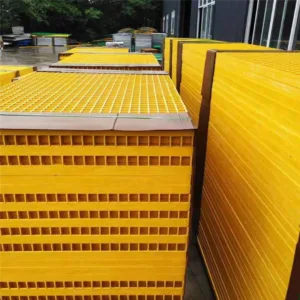In the world of construction and industrial applications, the choice of materials can often determine the success or failure of a project. Fiberglass bar grating, known for its durability, strength, and corrosion resistance, has become a popular choice for various applications, ranging from walkways and platforms to filters and shields. However, with the myriad of manufacturers out there, selecting the right fiberglass bar grating factory for your needs can be a daunting task. This article aims to guide you through the process, ensuring that your decision is informed and tailored to your specific requirements.

fiberglass bar grating factory
Understanding Fiberglass Bar Grating
Fiberglass bar grating is a material made from fiberglass strands that are interwoven and then set in place with a resin. This combination gives it unique properties such as high strength, corrosion resistance, and lightweight, making it an ideal alternative to traditional metal gratings in many environments.
Benefits of Fiberglass Bar Grating
- Durability and Strength: Despite its lightweight, fiberglass bar grating is designed to withstand heavy loads, making it suitable for industrial flooring where durability is crucial.
- Corrosion Resistance: It is highly resistant to rust and chemical corrosion, making it perfect for harsh environments.
- Lightweight and Easy Installation: Its lightweight nature makes it easy to transport and install, reducing overall project costs.
Key Factors in Choosing a Factory
When selecting a fiberglass bar grating factory, there are several factors you need to consider:
Quality Certifications and Standards: Ensure the factory adheres to international quality standards and has the necessary certifications. This guarantees that the products you receive meet high-quality benchmarks.
Manufacturing Capabilities: Consider the factory’s ability to customize orders and its volume capacity. A factory that can tailor its products to meet your specific needs and handle your order size is preferable.
Location and Shipping: The factory’s location can significantly affect shipping times and costs. Opt for a factory with strategic shipping options to minimize these aspects.
Assessing the Factory’s Reputation
A factory’s reputation can speak volumes about its reliability and quality of products. Look for customer reviews and testimonials to gauge previous clients’ experiences. Additionally, a factory with extensive industry experience and expertise is likely to offer superior products and services.
Cost Considerations
While cost should not be the sole deciding factor, comparing quotes and understanding the value offered by each factory is essential. Opt for a factory that offers competitive pricing without compromising on quality.
Sustainability and Environmental Practices
In today’s eco-conscious world, choosing a factory that employs sustainable materials and environmentally friendly manufacturing processes is beneficial, both ethically and for public perception.
After-Sales Service and Support
Post-purchase support is crucial. Look for factories that offer solid warranties, guarantees, and responsive customer service to address any issues post-installation.
Visiting the Factory
If possible, visit the factory to get a firsthand look at their manufacturing processes, quality control measures, and to discuss your needs directly. This can provide valuable insights and help you make a more informed decision.
How to Choose the Right Fiberglass Bar Grating Factory for Your Needs
Before finalizing your decision, compile a checklist of your specific needs, questions, and concerns. Use this checklist during your research and factory visits to ensure all your criteria are met.
Conclusion
Choosing the right fiberglass bar grating factory is a critical decision that can affect the success of your project. By considering the factors outlined above, you can select a factory that meets your quality standards, budget, and specific needs, ensuring a durable and reliable end product.




























